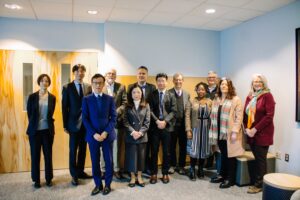The Dispute Resolution Center of King County (KCDRC) recently participated in an exciting international exchange hosted by KCDRC and the University of Washington School of Law. This event, organized with the university’s support, included dynamic discussions with Commissioner Hon. Jonathon Lack, Professor Terry J. Price, a judge from Uganda, and family court representatives from Japan (Yasufumi Oshima, Shinnosuke Yamaguchi, Hisa Fujino, Takeshi Hitotsuyanagi.) KCDRC board member, Alan Kirtley, an associate professor emeritus at UW, and Board President, Sara Sandford, who helped provide Japanese translation during the event, were integral to the success of these conversations. Together, we explored family law practices, cultural influences, and strategies to advance alternative dispute resolution (ADR). We are deeply grateful to UW and all participants for fostering this meaningful collaboration.
Putting Families First
Hon. Commissioner Lack and Professor Price emphasized the importance of keeping legal processes from interfering with parent-child relationships. Societal changes, such as women’s increased workforce participation, have influenced custody dynamics, shifting from traditional assumptions to more equitable approaches. They emphasized that mandatory ADR is helping reduce court involvement, ensuring that decisions are guided by what is best for children rather than prolonged legal battles.
Insights from Japan
Japan’s family court representatives shared upcoming changes, including a presumption of joint custody starting in 2026 and mandatory mediation in family court. They noted challenges with ADR development in Japan and were eager to learn from KCDRC’s experience.
KCDRC highlighted its accessible services, such as sliding scale fees and free services for those in need, while maintaining separation from legal advice. Discussions delved into cultural differences in parenting plans, such as how societal expectations influence custody agreements and decision-making processes. For example, Japan’s approach often reflects hierarchical organizational structures, where authority figures guide decisions, compared to KCDRC’s collaborative, facilitative, and flexible methods that emphasize individual agency and adaptability.
Further conversations examined the role of technology in intake processes, with Japan exploring online surveys to streamline data collection, while KCDRC shared its experience balancing digital and in-person approaches post-COVID. These discussions highlighted how cultural norms, and organizational styles shape strategies and impact service delivery.
A Unique Opportunity
Dave Martine, KCDRC’s Executive Director, summed up the experience: “The opportunity to exchange ideas with colleagues from another country was such a unique and enriching experience. I deeply value learning about other cultures and how those differences influence laws, policies, and interactions.”
Looking Ahead
KCDRC is grateful to the University of Washington and all participants for fostering this collaboration. The conversations reinforced how alternative dispute resolution can bridge cultural and legal differences to support families and communities worldwide.


